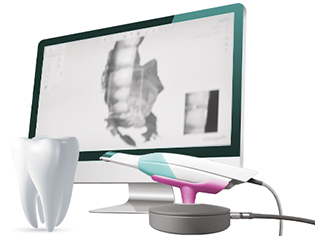Dental x-rays
While commonly referred to as x-rays, dental radiographs provide valuable insight into your oral health by capturing detailed images of your teeth and supporting bone.
With these images, our dental team can detect issues that may not be apparent during a visual dental examination, allowing us to provide an effective and personalised treatment plan for your needs.
Why would I need a dental x-ray?
Dental x-rays play a crucial role in modern dentistry and early detection of dental problems. They enable us to identify cavities, assess the health of your tooth roots and surrounding bone, diagnose and monitor gum disease, and evaluate the presence of teeth that are missing or wisdom teeth.
Additionally, dental x-rays are essential for planning orthodontic treatment, dental implants, and other restorative procedures including crowns and dental bridges. By detecting issues early on, dental radiographs help prevent the progression of dental problems, ultimately saving you time, money, and discomfort.
How do you capture a dental x-ray?
Performing a dental x-ray involves several steps to ensure accurate imaging. Here’s our easy guide on how it’s done:
You will be positioned for your x-ray
Ask about your general health and any dental concerns or issues you may have had since your last visit.
You will be asked to remain still throughout the process and the machine will be activated to capture the x-ray. The exposure time is brief, usually consisting of a few milliseconds.
Your clinician will then examine the results. In the case of a digital x-rays, the image appears almost instantly on the computer screen. The dentist reviews the x-ray to assess dental health, detect cavities, evaluate supporting bone, and identify any anomalies and reports their findings.
Remember that dental x-rays are essential for diagnosing dental issues early and planning treatments effectively. The process is safe, and the radiation exposure is minimal. Regular dental x-rays contribute to maintaining oral health.
Diagnosing dental concerns with advanced technology
At mydentist, we are proud to offer patients the latest dental technologies to enhance their treatment. These innovations not only improve the precision and effectiveness of treatments but also ensure a comfortable and streamlined experience for patients.
There are several steps your clinician can take to evaluate your dental condition. We will provide a thorough examination and including appropriate x-ray imagery as required. Learn more about the advanced technologies we may offer as part of your treatment.
X-rays FAQs
Are dental x-rays safe?
Yes, dental x-rays are considered safe when performed with proper precautions. The amount of radiation exposure from dental radiographs is minimal, especially with modern digital radiography techniques.
Additionally, our dental team takes every precaution to minimise radiation exposure. The benefits of dental radiographs in diagnosing and preventing oral health issues far outweigh any risks associated with radiation exposure.
However, if you are pregnant or have specific health concerns, it's important to inform your dentist beforehand to ensure appropriate precautions are taken. Dental radiographs are a valuable tool in helping you manage your oral health.
Why do we need dental x-rays?
Dental x-rays, where appropriate, will be taken as part of your dental examination to aid a full diagnosis. They help your dentist to identify any anomalies that may not be visible during a visual examination, ensuring they can treat them appropriately.
What are the different types of dental x-rays?
Your clinician will use their knowledge to decide on the most suitable option for your dental needs. At mydentist, we offer digital x-rays at all practices and 3D x-rays in some larger practices as required.
How often will I need a dental x-ray?
The frequency of dental x-rays varies from person to person, by referring to the latest guidelines your dentist will advise you how often you should have dental x-rays based on your dental condition and history.



